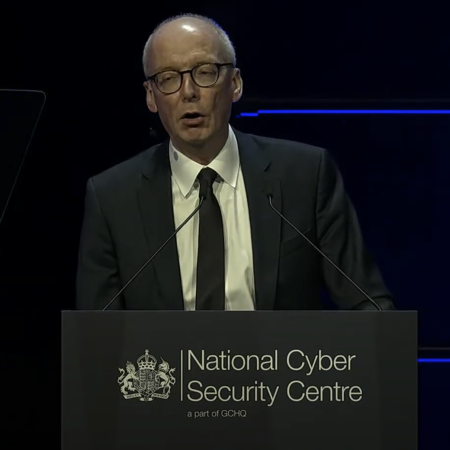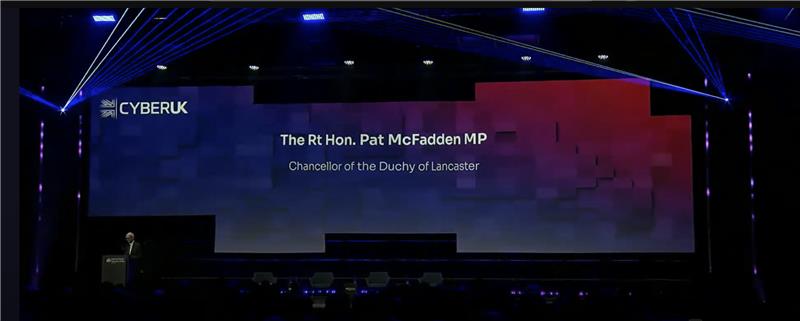This year’s CyberUK conference started with a compelling speech delivered by the Rt. Hon. Pat McFadden MP, Chancellor of the Duchy of Lancaster. His address reinforced:
- The urgency of cyber threats facing the UK.
- The importance of collaboration across sectors.
- The expansive opportunities within this critical industry.
Here’s an overview of the key messages and what they mean for businesses and organisations across the country.
The rising threat landscape
Cyber crime is no longer a distant or hypothetical issue. It’s an urgent and growing concern affecting every sector. Pat McFadden described the current landscape as a “digital shakedown”, with organised criminal groups targeting businesses large and small.
Recent high-profile cyber attacks on Marks & Spencer, Co-op, and Harrods have demonstrated just how severe these incidents can be. The National Cyber Security Centre (NCSC) received nearly 2,000 reports of attacks last year1, including 12 classified as severe. Alarmingly, this is three times the number of severe incidents recorded the year before.
The message is clear: the threat is escalating, and every organisation must rise to the challenge of protecting its digital perimeter.
Public-private collaboration will build resilience
McFadden stressed how important public-private collaboration will be in combating cyber threats. The CrowdStrike incident last year was a big reminder that we need unified action. It included partnerships between tech leaders like Microsoft and CrowdStrike, and government bodies such as the NCSC and Cabinet Office.
Partnerships are at the heart of the UK’s strategic approach to cyber security. McFadden noted that robust defence can’t be achieved alone and called for deeper cooperation between states, private companies, and international organisations.

Cyber security as an economic opportunity
Beyond its role in defence, McFadden framed cyber security as a “poster child for growth.” The sector already contributes significantly to the UK economy, supporting over 67,000 jobs and generating £13 billion in annual revenue.
The government is determined to seize the opportunity to make cyber security a foundation of its upcoming Industrial Strategy, emphasising regional growth. For example, the average cyber salary in the North West has hit £54,600, with further economic potential on the horizon, underscored by initiatives like the £1 billion Golden Valley campus near Cheltenham, projected to create 12,000 jobs.
The Minister announced plans to bolster the sector further with insights from an independent report by Imperial College and Bristol University, which will provide recommendations for maximising cyber’s economic impact.
Strategic cyber initiatives to watch out for
The UK government is investing in initiatives to strengthen national and global cyber security capabilities.
Some of the most notable efforts mentioned in the speech:
The group’s methods include phishing emails, stolen credentials, and privilege escalation tools like Mimikatz. DragonForce’s shift to a RaaS model marks their transformation into a professionalised extortion machine targeting high-profile victims.
1. International collaboration
Significant resources are being allocated to assist the UK’s global allies and maintain international cyber vigilance.
These include £8 million to reinforce Ukraine’s cyber defences and £1.1 million to support Moldova in securing its elections from cyber interference.
China’s advanced cyber capabilities were also highlighted, with the government taking a pragmatic approach that balances robust defence and strategic engagement.
2. Innovation in AI security
The government is expanding its Laboratory for AI Security Research (LASER) initiative. There’ll be £7 million in new funding for AI-focused cyber security projects.
Partnerships with companies like Cisco will deliver innovation and demonstration projects, including research hubs across top UK universities. This is an effort to use AI as a tool for improving national security measures.
3. Strengthening cyber regulation
Introducing the highly anticipated Cyber Security and Resilience Bill will:
- Strengthen the nation’s cyber defences
- Let Technology Secretary to direct regulatory actions to reinforce cyber protections
- Improve the security and resilience of software that organisations use through the Software Security Code of Practice
A vision for the future
With the challenges of growing cyber threats comes an incredible opportunity. McFadden offered a forward-looking vision of how the UK’s expertise in creativity and innovation uniquely positions it to lead in the global cyber security space for decades to come.
While cyber attacks are all but guaranteed to remain a feature of the modern world, the UK is committed to defending democracy and protecting allies on the global stage while driving economic progress at home. Through investment, collaboration, and strategic planning, cyber security is being transformed from a necessary defence into a powerhouse for growth and leadership.
What does this mean for your business?
We’re here to help you protect your business and stay compliant with evolving regulations. From penetration testing to assisting with Cyber Essentials Plus certification, we’ve got the tools and expertise you need to stay secure in the complex threat landscape.
Want to discuss your current cyber security measures or explore how to strengthen your defences for the future?

